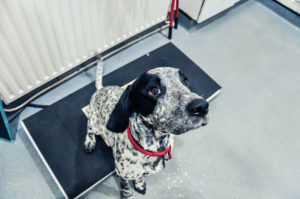
We love seeing dogs at Young Veterinary Partnership. A dog is “man’s best friend” but owning a dog is a big commitment, which depending on the breed chosen will last on average for 10-15 years. Puppies need more care and attention which is a lot of fun particularly when they are so cute , but remember that when adult they will still need once or twice daily feeding, exercising twice daily, and grooming. They should have regular veterinary check ups to keep them healthy, ( at least 2x yearly), yearly vaccinations, regular worming, monthly flea treatment, monthly lungworm prevention. If possible tooth brushing with dog toothpaste should be performed daily or every few days.
When they are senior citizens, (over 8 years old), annual blood tests are recommended to screen for problems such as kidney disease, diabetes and liver problems.
We have produced short guides for you, discussing the common issues raised in choosing a puppy and caring for your puppy.
Click Choosing a puppy for our guide
Click How to care for your puppy for our guide

Training is essential to ensure you have a well mannered pet.
Puppy classes are a great way to introduce your puppy to other dogs in a friendly environment. In general training your dog is done by reward. When they do something correctly, you should give them verbal praise followed immediately by a small treat. Eventually they will be happy with verbal praise , so that you don’t have to give a treat all the time. Clicker training is similar in that you use the clicker to make a click and give them a treat immediately afterwards, when they have behaved correctly. Eventually you will be able to the click without giving a reward all of the time.
If they exhibit bad behaviour, do not shout or tell them off. You need to ignore them. They want attention just like children and soon learn if they are ignored that they have done something wrong. You can either leave the room, or put them out of the room to ignore them.
Dogs like people are individual, and no one dog food will suit all pets. We stock and recommend Hills science diets as a good complete dry food, which can be purchased from the surgery or via our online shop. Introduce any new food gradually over a few days. If your pet has a digestive upset, feed them chicken or fish and rice for a few days, and then gradually re-introduce their normal feed. Puppies should be fed specific puppy food until they have stopped growing ( around 1 year of age but can be later in giant breeds), which contains higher protein levels. You should not supplement a puppy food with additional minerals or vitamins, as puppy foods already have the correct balance of vitamins and minerals. You can feed a complete dry food only, or a mixture of tinned dog meat and mixer biscuits. Adult dogs will be fed once or twice daily. The amount to be fed can be estimated from the weight of your dog, using the guides on the packets of dog food. However you may need to weigh your dog every few months to ensure that their weight is stable. To assess whether your pet is the correct weight, in an adult dog, you should be able to feel the dogs individual ribs, but not be able to see them sticking out. Dogs do not need their food to be varied, so if you find a dog food that suits your pet then try not to change it. The more you change the food, the pickier your pet may become ( this particularly applies to small breeds). If your pet is passing normal looking, formed stools, at a normal frequency, has a stable weight, has a healthy looking coat, and generally appears healthy then the diet you are feeding is likely to be a suitable one.